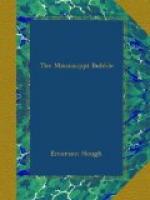He saw it fairly from its beginning, this growth of the maize, this plant which never yet had grown on Scotch or English soil; this tall, beautiful, broad-bladed, tender tree, the very emblem of all fruitfulness. He saw here and there, dropped by the careless hand of some departed Indian woman, the little germinating seeds, just thrusting their pale-green heads up through the soil, half broken by the tomahawk. He saw the clustering green shoots—numerous, in the sign of plenty—all crowding together and clamoring for light, and life, and air, and room. He saw the prevailing of the tall and strong upthrusting stalks, after the way of life; saw the others dwarf and whiten, and yet cling on at the base of the bolder stem, parasites, worthless, yet existing, after the way of life.
He saw the great central stalks spring boldly up, so swiftly that it almost seemed possible to count the successive leaps of progress. He saw the strong-ribbed leaves thrown out, waving a thousand hands of cheerful welcome and assurance—these blades of the corn, so much mightier than any blades of steel. He saw the broad beckoning banners of the pale tassels bursting out atop of the stalk, token of fecundity and of the future. He caught the wide-driven pollen as it whitened upon the earth, borne by the parent West Wind, mother of increase. He saw the thickening of the green leaf at the base, its swelling, its growth and expansion, till the indefinite enlargement showed at length the incipient ear.
He noted the faint brown of the ends of the sweetly-enveloping silk of the ear, pale-green and soft underneath the sheltering and protecting husk, He found the sweet and milk-white tender kernels, row upon row, forming rapidly beneath the husk, Mud saw at length the hardening and darkening of the husk at its free end, which told that man might pluck and eat.
And then he saw the fading of the tassels, the darkening of the silk and the crinkling of the blades; and there, borne on the strong parent stem, he noted now the many full-rowed ears, protected by their husks and heralded by the tassels and the blades. “Come, come ye, all ye people! Enter in, for I will feed ye all!” This was the song of the maize, its invitation, its counsel, its promise.
Under the warped lodge frames which the fires of the Iroquois had spared, there were yet visible clusters of the ears of last year’s corn. Here, under his own eye, were growing yet other ears, ripe for the harvesting and ripe for the coming growth. A strange spell fell upon the soul of Law. Visions crossed his mind, born in the soft warm air of these fecundating winds, of this strange yet peaceful scene.




